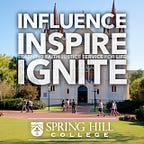CLOSER TO HOME AND CLOSER TO GREAT OPPORTUNITIES
“Closer to home.” Three words that are resonating with future college students and their families as a result of COVID-19. “Closer to home” may mean selecting a college that feels safer, more secure because of impacts from the virus or as a way to help out if there’s been a negative effect on family finances.
Spring Hill College has always been considered home to students. It’s a small, residential campus, where “everybody knows your name.” It’s where students are mentored by faculty and administration. Where small college life can blend into classwork — like an afternoon baseball game on Stan Galle field that might just mean History class moves to seats above the dugout. It also means that Spring Hill College has a wealth of ties to the local business community. These are valuable relationships for students as they begin their post-graduation career outreach.
RETURN ON INVESTMENT WITH LOCAL IMPACT
Forbes recently recognized Spring Hill College as one of the top 10 colleges in the country for value in a college degree. In “Third Way’s Price-To-Earnings Premium: A New Way To Measure The Economic Value Of College,” Forbes’ Senior Contributor Michael T. Nietzel uses Price-To-Earnings Premium, or PEP, to calculate the return on investment of various higher education programs. He noted that the “list illustrates that colleges can earn a good PEP score (the shorter the time to pay down net costs, the better) in two ways: low net costs … where students can cover their college costs in less than one year; or high median earnings ten years after enrollment, as is the case with Stanford, Princeton, Georgia Tech and Harvard.” A small college with this kind of national impact underscores the value of a Spring Hill education; a value that outperforms the larger state institutions, according to the study.
Spring Hill College Director of Career Placement, Jeremy Moore, knows the local impact of a Spring Hill education.
Q: Spring Hill College is a great choice for students who want to go to school closer to home. How does that translate to career opportunities for local grads?
A: Choosing a college closer to home allows students more opportunities for professional development and networking. Being local, they already are familiar with the major industries and the regional employers. Naturally, they have relevant network connections through family, friends and their churches. By remaining within the region, they can also pursue opportunities year around. We have had several organizations contact Career Development looking to staff positions with college students that can join their team part-time through graduation and then move into a full-time role. As you can imagine, landing a permanent position while working through your program of study greatly enhances class content. Students who live out of the region often postpone job and internship searches until they return home. Many job opportunities have been filled by then. Local students don’t have to delay their job/internship searches or worry about housing.
Q: What is the perceived value of a Spring Hill College degree to local employers?
A: Spring Hill College is recognized as an institution that produces skilled students with a great work ethic. The value of hiring a Badger is especially high if the applicants are local or planning to remain in the area after graduation.
Q: Are there insights or do they track if our graduates are successful with them?
A: Spring Hill grads are recognized as solid employees in many area business sectors including the Mobile County Public School System, area hospitals and businesses related to the Port of Mobile.
Q: What is the value to our students of the local alumni network?
A: Spring Hill alumni are incredibly helpful in providing opportunities for professional development. They return to campus to recruit, host info sessions, deliver guest lectures, share job and internship opportunities, step up to mentor students and connect them with others in their network when appropriate. Some have created internship opportunities for students to gain practical experience saying that they are simply paying back what an alumnus did for them when they were studying on The Hill. That’s invaluable. As your network expands so do your options.
Q: Describe the student-by-student or customized approach you take to career counseling.
A: While we have specific services, each student is viewed as an individual with unique gifts, interests, passions and goals. Through the career counseling process, we have a very pragmatic discussion about students’ circumstances (degree, career intentions, family, financial circumstances, etc.). We strive to ensure that students know the value of their degree and help them identify opportunities that ensure that they can realistically meet their personal and professional goals. It’s OK to be unsure about the direction that they want to go. We learn best through doing: initiating and completing tasks, entering and adjusting to the work environment, building relationships with colleagues and clients, etc. They may have to repeat the cycle — act, assess, adjust — until they find what fits.
Q: What’s gratifying about working so closely with students to help them get their first post-college position?
A: Seeing the dream become a reality. It takes a lot of work in and out of the classroom. Watching students build resilience by overcoming obstacles and challenges never ceases to inspire not only me but their professors and peers alike. Whether they start their career, land a service role or continue on to graduate/professional school, they are embracing their potential and gaining confidence. Business recruiters see positivity and drive and want it in their organization. That’s why we have a higher percentage of students that get accepted to graduate/professional programs and why 99.5 percent of the Class of 2019 were placed within six months of graduation. Positivity is contagious.
Closer to home. Three words that keep sounding better and better.
